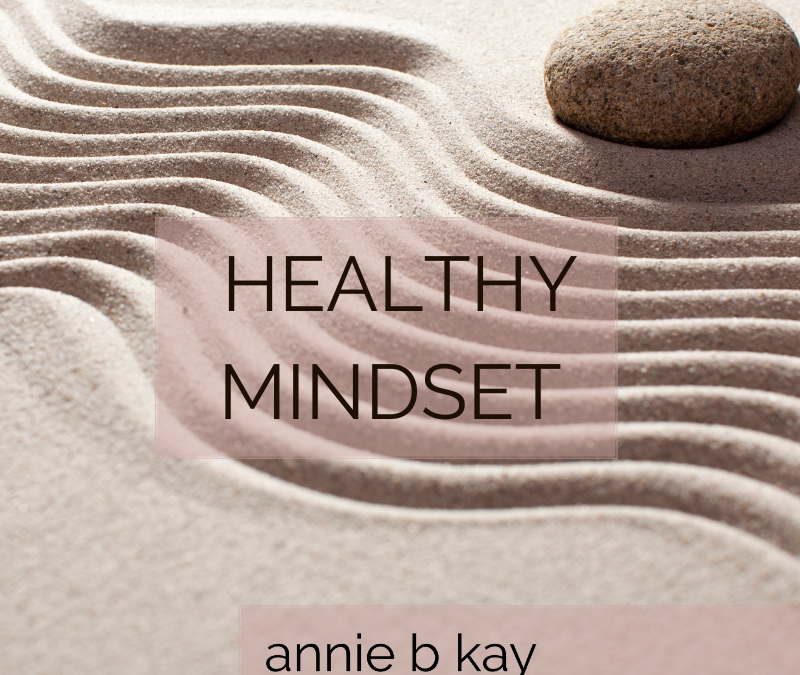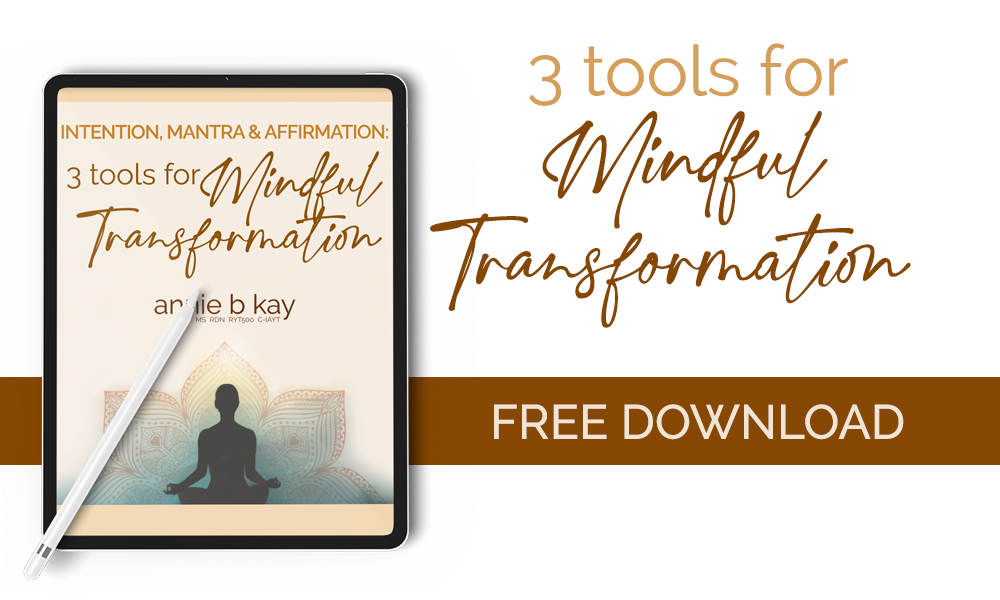My Healthy Mindset Wake-up
I was recently reading my weekly horoscope (yep, I find it helpful), which said to the effect: out with the old, in with the new.
It’s been a challenging few years, and I know I haven’t had the healthiest mindset. So I was ready for ‘out with the old’; a list sprung to mind: isolation, too much TV, too little movement and a heavier starchier diet than I know serves me.
But what, I wondered, was the new? What is the affirmative vision for myself, my life and my health now? I was pretty close to stumped. This, my friends, can be an indicator of the need for an overhaul.
Heading into my 60’s, I’m changing for the better and….the different. Metabolic issues are knocking, mental health is usually good but…I need more tenderness of care, and to be more gentle with myself.
Where to begin?
My Ayurvedic brothers and sisters say it all begins in the mind. I’ve been skipping the mindset exercise in every training I’ve taken these past couple of years…maybe it’s…
Mindset. I want a healthier mindset.
Mindset & Mental Health
Health is a state of body and of mind (and spirit, energy and more). Mental health is much more than not having a condition like depression or anxiety. A healthy mindset is about being and feeling empowered in life, feeling and appreciating your full range of emotions, having the tools and the skill to manage stress well, and being able to deal with everyday ups and downs.
What is a Healthy Mindset?
A healthy mindset is having a flexible, realistic yet optimistic approach to life. It encompasses things like high self-esteem and self-approval or acceptance, and a willingness to learn from what unfolds in life – even your difficult and uncomfortable experiences. The essential ingredient of your healthy mindset is your thoughts. If you can learn and grow from your own thoughts, and change them, rather than being overly reactive and controlled by unhelpful thoughts, you have yourself a healthy mindset.
Cultivating a healthy mindset helps you to cope with stress and life’s challenges more effectively, so it supports helpful habits. A healthy mindset isn’t a destination or an achieved fixed-state of being. It is a journey; a practice. It is an evolving and ever-changing process you actively work at. It takes time and attention to recognize your areas of focus to develop a healthier mindset, and the process is imperfect, but if you are interested in leading an examined life, it’s very worth it. With time and imperfect effort, you can become a friend to yourself or even feel abiding self-love.
It happens – a lot!
Mindfulness & Healthy Mindset
Mindfulness is one approach (the one I use in my practice) to a healthy mindset. It is a practice that can help you see things as they are, not as you imagine them to be, or as you fear they might become. It’s about being fully present and aware of the moment, moment by moment, without judgment. A person with a healthy, or growth mindset believes their own characteristics like intelligence are not fixed but can change with attention and practice.
The first step towards developing a growth mindset is becoming aware of your current beliefs. Once you become aware of your thoughts and underlying beliefs, you can work on changing thoughts and characteristics of yourself that are not so helpful.
Why Having a Healthy Mindset Matters
A healthy mindset has been shown to improve health including making healthy foods more appealing. It can help you to feel more in control and less stressed in daily life. When you feel able to have more in control (or as though you are participating in what the heck is happening), it’s easier to be wise about solutions to problems (rather than waiting and hoping for someone else to step in, or a miracle). We all know that miracles happen all the time, but creating your own is empowering, and just might make miracles more likely.
A growth mindset can help you to see the best in others, have more realistic expectations of yourself, and see setbacks and difficulties as opportunities to grow and learn. When you have realistic expectations of yourself, you are less likely to become stressed or anxious when you make mistakes or don’t meet your own impossibly high standards. This in turn makes you more likely to be kinder to yourself and help you avoid self-sabotage or blaming others for your problems.
Sounds easy, right? Well, not so much. It’s a practice. So, when you begin, you may not be very good at it. Keep practicing. You’ll get better at it.
We’re all imperfect beings. We all make mistakes – sometimes doozies. Learning from our mistakes while understanding that making mistakes is a natural part of life is part of having a healthy mindset.
What the Yogis Say: Compassion & Witness
Yoga and Ayurveda have a lot to say about mindset. Yoga philosophy and psychology focus on your inner landscape, so naturally address mindset. Recent science suggests that a yoga mindset is a very healthy mindset in today’s world. This quote by Swami Kripalu is a beautiful summary of a yoga mindset.
“The highest spiritual practice,” said Swami Kripalu, “is self-observation without judgement.”
Yoga & Compassion
Mindfulness, which is paying attention moment by moment, can help you to relax and enjoy what’s happening right now. Taking the bit of extra time that mindfulness requires helps you take kinder, more thoughtful, less reactive action. It slows you down!
When you slow down, relax and tune into what is happening around you, it’s easy to appreciate smells, colors, sounds, tastes and textures of the world around you. You’ll likely enjoy the experience more than if you rush through it, be it having a meal or going through your usual morning routine.
Two guiding principles drawn from the Yoga Sutras, a foundational philosophical text of yoga, are non-violence (Ahimsa, in the ancient language of Sanskrit) and contentment (Santosa). The practice of non-violence or compassion is central to a yogic lifestyle. So, the practitioner pays attention to their own thoughts and choices, and aims to become more and more compassionate with themselves and others over time. Contentment is another tenet of yoga practice – again, not a destination or something you finally achieve, but an ongoing practice happening right now. You can cultivate contentment now. It’s a practice. You get better at it.
Yoga & Witness Consciousness
Do you find it hard to pause in the moment – when you get triggered – before responding impulsively?
Along with compassion, being able to ‘step back’ or take a pause – especially when you get poked or irritated – is called ‘accessing the witness’. When you mentally step back, pause and consider the situation from a broader, less judgemental perspective – you actually change your consciousness. You access witness consciousness.
As you practice non-judgemental awareness, it gets easier to understand that you are doing the best you can with imperfect information, and that much of what you do is rational – maybe even admirable. Non-judgemental awareness also allows you to experiment with a different response than your emotional self might. Being mindful can help you recognize when you’re feeling overwhelmed and in need of support.
Setting Intention
With regard to mindset, intention is getting clear on what you are seeking. I often ask people what they are looking to cultivate in life from the habit we’re experimenting with…be it eating well or moving more or practicing healthful habits. Intention speaks to the why – the personal why that motivates your behavior.
Here are a couple of my past writings on setting your intention, and preparing to set intention by letting go of what no longer works.
Here, also, is a meditation practice that can be very helpful in shifting your mindset. It’s called loving-kindness (metta) meditation. Enjoy.
Loving Kindness (Metta) Meditation
Loving Kindness (Metta) meditation is a tool that can help you, over time, adopt a healthy mindset toward yourself and others.
In loving kindness meditation, we wish ourselves well, several times until we feel it. Then, we expand our bubble of loving kindness to someone we love who could use it – a sick relative, a struggling friend. You can continue to expand, to your community, country, world itself, then back to you. Here is an easy version of a loving kindness meditation, from my friend and colleague, Stephen Cope (Kavi).
May I be happy,
May I be healthy
and May I stand in the light of my own true self.
You might begin this meditation for 5 minutes daily, and slowly increase it to at least 10 minutes most days. Twenty is even better!
Here is an episode of Quickeners, a podcast I host, on Metta Meditation.
Enjoy.
Manifestation: Breath, Believe, Receive
Setting your intention, then adopting an experimental mindset of noticing and adjusting is a mindful approach to making change easier. Breathing and relaxation exercises, meditation, and visualization can all help keep you in the flow of helpful shifts. These practices can also help to keep you grounded in the present moment.
In this process, it’s important to think in terms of learning when things don’t go as planned. Rather than give up, you compassionately examine what happened, and think about how to overcome the obstacle that made the practice too hard to do. There is not failure, just lessons.
Focused attention and helpful affirmations can also support mindset. Imagining a vision of what your future might look like is a great way to keep you motivated. When you feel discouraged or frustrated by setbacks along the way, access your witness consciousness and remind yourself that you’re a human in an imperfect world that is progressing. Whatever you need to do – a glass of water, or saying to yourself “that happened” – to clear and get back to practice. If you can do that, I can guarantee you transformation.
It’s All Happening
Mindfulness helps you enjoy your unique journey, rather than constantly worrying about your destination. It can help you to be less attached to outcomes, no matter how important they are to you. It can help you to let go of expectations, and see things more as they are, rather than as you imagine them to be or as you fear they might become.
Most importantly, mindfulness meditation helps you to appreciate the moment you are in, and the one unique wacky painful beautiful life you have. It can help you to be more fully present in your everyday life and for those you love. It’s a tool to help let go of the past and of worries about the future. It can help you to see the beauty and magic in the world around you, and realize that events and experiences are happening in such a way as to benefit your spiritual progress, even if it doesn’t seem so in this moment.
Namaste. Keep going.
What is a healthy mindset for you?
What helps you notice and shift, reset or keep a healthful mindset?
We want to know – send us a comment!
Annie




